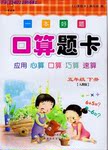题目内容
【题目】In my driving lesson, I learned a traffic rule that at no time _____ parked in a manner which will block emergency service.
A.any vehicle is
B.is any vehicle
C.can any vehicle be
D.any vehicle can be
【答案】C
【解析】考查倒装句。句意:根据我的驾驶教训,我明白了一条交通规则,就是在任何时候车辆绝不能停在阻塞应急服务的地方。at no time是否定词放在同位语从句的句首,句子要部分倒装。根据语境,要用can表“能”, vehicle是被停放,故用被动,故选C。

练习册系列答案
 一本好题口算题卡系列答案
一本好题口算题卡系列答案
相关题目